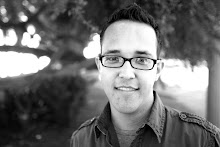The basis for much of my thinking about God (and the rest of life, for that matter) is that I cannot know anything with complete certainty for the simple reason that I am not omniscient. Because I am a limited, finite human being, there is always a chance that I am wrong about the things I think I know. It is important to note, however, that this isn't a crippling realization for me. It's something we all deal with everyday—it's a simple fact of life. Not knowing for certain which apple will be crisp, juicy, and sweet doesn't stop me from picking out apples in the produce section. Not knowing with absolute certainty whether my wife loves me didn't stop me from marrying her. Every decision I make is based on either approximations or trust (or occasionally on blind guesses).
So, I guess that means that my uncertainty about God is not qualitatively different from my uncertainty about which apples are tastiest. But there is certainly a quantitative difference. If we limit our discussion to the notion of existence, I can't be absolutely certain that the table I'm sitting at or the computer I'm using actually exist. There is some chance that I'm hallucinating or that I'm actually in some sort of interactive simulation (like in the Matrix). However, my uncertainty about the existence of the table or computer are obviously quite different from my uncertainty about God. I think what it comes down to is sensation....
In ordinary life, the way that we "know" something exists is that we can sense it. That means we rely on sight or touch or some combination of our senses (or, in the case of scientists, they rely on their instruments to do the sensing for them) to suggest to our minds that there is something there. For the most part it is pretty straight-forward—I can see a chair in front of me, I can touch its wooden back and padded seat, and I "know" that it exists. In ordinary life, it doesn't matter that theoretically I could be wrong. I base my day-to-day living on this type of "knowledge."
However, there are some things that aren't quite as straight-forward, some things that are kind of on the edges. Usually they are things that we sense only briefly, infrequently or faintly, like hearing noises when we're home alone or like seeing faint, quick shooting stars. We sense them but because we can't really hear or see them again, we're uncertain about their existence. To some extent, it seems to me that God often falls into this category. Experiences of God are often hard to grasp and hold onto, they are brief and often occur when we least expect it. For some people, these brief experiences are enough to say that they "know" God exists. However, for many of us, our experiences of God are similar to uncertain noises or faint shooting stars, leaving us unsure whether the experience was real.
So, when I talk about being uncertain about God's existence, I'm not talking in a purely theoretical sense—for me, the latency of God has as much to do with lived experience as it does with theory. As much as I wish God's existence were as apparent to me as the physical objects I encounter in everyday life, that just isn't the case. Even if the existence of physical objects is theoretically questionable, it seems to me that God is questionable in a much more real sense than that.
You can call God mysterious, unfathomable, unknowable, or infinite.
I'll call God uncertain.


No comments:
Post a Comment
Let me know what you think....